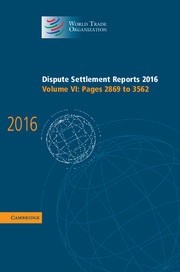Book contents
- Frontmatter
- Contents
- European Union - Anti-Dumping Measures on Biodiesel from Argentina (WT/DS473): Report of the Appellate Body
- European Union - Anti-Dumping Measures on Biodiesel from Argentina (WT/DS473): Report of the Panel
- Colombia - Measures Relating to the Importation of Textiles, Apparel and Footwear (WT/DS461/13): Award of the Arbitrator
- Cumulative List of Published Disputes
Colombia - Measures Relating to the Importation of Textiles, Apparel and Footwear (WT/DS461/13): Award of the Arbitrator
Published online by Cambridge University Press: 24 July 2020
- Frontmatter
- Contents
- European Union - Anti-Dumping Measures on Biodiesel from Argentina (WT/DS473): Report of the Appellate Body
- European Union - Anti-Dumping Measures on Biodiesel from Argentina (WT/DS473): Report of the Panel
- Colombia - Measures Relating to the Importation of Textiles, Apparel and Footwear (WT/DS461/13): Award of the Arbitrator
- Cumulative List of Published Disputes
Summary
INTRODUCTION
On 22 June 2016, the Dispute Settlement Body (DSB) adopted the Appellate Body Report and the Panel Report, as modified by the Appellate Body Report, in Colombia – Measures Relating to the Importation of Textiles, Apparel and Footwear. This dispute concerns the imposition by Colombia of a “compound tariff” on the importation of certain textiles, apparel, and footwear classified in Chapters 61 through 64 of Colombia's Customs Tariff. The compound tariff was introduced by Decree of the President of the Republic of Colombia No. 074 of 23 January 2013 (Decree No. 074), which was subsequently “replace[d] and repeal[ed]” by Decree of the President of the Republic of Colombia No. 456 of 28 February 2014 (Decree No. 456). Decree No. 456 entered into force on 30 March 2014 for a period of two years. Decree No. 456 was extended, first, until 30 July 2016, and, subsequently, until 1 November 2016. The Panel and the Appellate Body found that, in the instances identified in the Panel Report11, the compound tariff exceeds the bound tariff rates in Colombia's Schedule of Concessions, and is therefore inconsistent with Article II:1(a) and (b) of the General Agreement on Tariffs and Trade 1994 (GATT 1994).
At the meeting of the DSB held on 22 June 2016, Colombia informed of its intention to implement the DSB's recommendations and rulings in this dispute, and stated that it would need a reasonable period of time in which to do so. By letter dated 8 August 2016, Panama informed the DSB that consultations with Colombia had not resulted in an agreement on the reasonable period of time for implementation pursuant to Article 21.3(b) of the Understanding on Rules and Procedures Governing the Settlement of Disputes (DSU). Panama therefore requested that this period be determined through binding arbitration pursuant to Article 21.3(c) of the DSU. Panama and Colombia were unable to agree on an arbitrator within ten days of the referral of the matter to arbitration. Consequently, by letter dated 19 August 2016, Panama requested the Director-General of the World Trade Organization (WTO) to appoint an arbitrator pursuant to footnote 12 of Article 21.3(c) of the DSU. The Director-General appointed me as the Arbitrator on 30 August 2016, after consulting with the parties. The parties were informed of my acceptance of the appointment by letter dated 5 September 2016.
- Type
- Chapter
- Information
- Dispute Settlement Reports 2016Volume VI: Pages 2869-3562, pp. 3489 - 3534Publisher: Cambridge University PressPrint publication year: 2017

